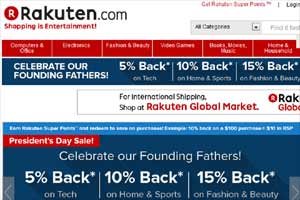Rakuten, Japan’s largest e-commerce company, has requested the Prime Minister’s Office and the commerce and industry ministry to allow inventory-led e-commerce in India, sources said.
In fact, officials of another Japanese retailer, Uniqlo, which is a clothing designer and manufacturer, also met Prime Minister Narendra Modi recently and made a similar request.
Currently, the Indian government only allows a marketplace model in e-commerce, which is essentially a platform that allows retailers and traders to sell their goods through websites.
The requests by the two companies were a part of the PM’s talks with Japan to boost foreign direct investment into the country, which is a low 1.7%.
“They (Rakuten and Uniqlo) have been requesting for a long time, but nothing has happened. In sales marketing in Japan and other developed countries, e-commerce takes a big share… Big investors are waiting for something concrete to happen,” said an official of the Japan External
Trade Organisation, requesting anonymity. He added that Uniqlo will invest not only in retail but also in e-commerce and manufacturing. It plans to open 100 retail outlets, which is expected to take its investments past Spanish retail giant IKEA’s Rs 10,500 crore spread over several years.
On his India visit last year, Jeff Bezos, CEO of US e-commerce giant Amazon, said his company would like to expand beyond the marketplace model if FDI norms allow in the future. Globally, Amazon gets about 40% of its business from the inventory-led model, and companies like Rakuten are expected to have a similar mix.
Rakuten, which sources from around the world wants an inventory-based model because that will allow the company to continue to do so, stock in India and sell without the intervention of a retailer. For Uniqlo it is much simpler — it can sell what it makes to its customers online.
E-commerce in India is growing 40-50% every year, and foreign retailers want to make use of that opportunity. As per the current rules and regulations, they can sell online on a marketplace site like Flipkart or Amazon, but not directly to customers. This erodes margins for retailers as they save up to 10% if they can sell directly, online.
The restriction has also stopped clothing manufacturers like Zara and H&M from selling online. If FDI in single brand e-commerce or inventory-led e-tailing is allowed, it can bring in a few billion dollars of investment into the country. However, the government is on the back foot due to the opposition from offline traders to e-commerce.
The e-tailing industry, which is already close to $4 billion, saw a discounting bloodbath last year. The coming of Chinese firm Alibaba and the Japanese firms is expected to start another round of discounting, which will only increase losses (Rs 1,000 crore at present) for Indian e-commerce companies. But with new players entering the fray, consumers will benefit.
By Sunny Sen


